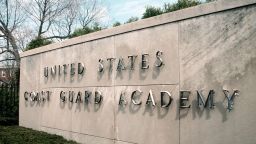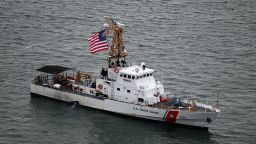Records turned over to Congress this month reveal how top officials at the US Coast Guard engaged in a calculated plan to conceal the damning findings of an investigation into decades of sexual assault cases at the agency’s academy, going so far as to create a list of the pros and cons of being transparent.
Coast Guard officials only told Congress about the explosive probe last year after CNN started making inquiries. Dubbed Operation Fouled Anchor, the multi-year internal investigation found that rapes and other sexual abuse at the prestigious Coast Guard Academy had been ignored and often covered up by high-ranking officials.
But telling Congress and the public about this scandal, leaders worried, could “risk the initiation of comprehensive Congressional investigations, hearings, and media interest,” according to 2018 internal records supplied to the Senate Homeland Security Committee’s Permanent Subcommittee on Investigations in February.
The records, which do not carry the letterhead or signature of any identifiable author, carefully laid out multiple possible courses of action, and the option to proactively brief Congress was “NOT RECOMMENDED.” Among the concerns listed were “intense scrutiny of all past to present CGA leadership,” a potential demand for all sexual assault cases to be reviewed and “extensive media coverage and investigative journalism…and suggested malfeasance.” Public scrutiny could raise questions about why actions taken over the past decade to change the academy’s culture had not improved sexual assault reporting rates, the records stated.
And in a handwritten list of pros and cons, which the Coast Guard confirmed to CNN was written by then-Vice Commandant Admiral Charles Ray, the “cons” of disclosing the investigation included “re-victimizing” and “investigations w/o end.” The “pros” were “rip bandaid off,” “proactive vs reactive” and “cultural guilt purged.”
“If things are bad, they get worse with non-disclo[sure],” Ray wrote in a separate note, which appeared to list viewpoints of different Coast Guard officials.
Ultimately, officials recommended in the records that information be provided to Congress or other parties only if asked.
The Coast Guard did not tell CNN who authored the recommendations and noted that they were made before the investigation was officially closed. The agency emphasized that current Commandant Admiral Linda Fagan has acknowledged it was a mistake not to disclose the investigation to Congress and said it is fully cooperating with the Senate investigation – sifting through more than a million pages of documents and only making legally necessary redactions.
CNN previously reported that the investigation’s concealing had gone to the top of the agency. The Commandant at the time, Admiral Karl Schultz, along with his second in command, Ray, had made the decision to keep Fouled Anchor secret after taking the helm in 2018. Ray resigned from a Coast Guard Academy leadership institute following CNN’s report on his role in withholding the information.
Ray and Schultz did not immediately respond to requests for comment.
Since the scandal came to light in June, Fagan has issued a series of unprecedented apologies to members of Congress, current and former academy cadets, and the entire Coast Guard workforce and has directed a host of reforms to how sexual assault cases are handled across the agency.
“These documents are troubling and raise new questions,” Sen. Richard Blumenthal, a Democrat from Connecticut, where the academy is based, and Sen. Ron Johnson, a Republican from Wisconsin, wrote in a letter to Fagan on Wednesday about the new records they received.
The senators are spearheading an investigation into the Coast Guard, which was launched in September in reaction to CNN’s reporting. Both senators have lambasted the Coast Guard for its lack of transparency and cooperation with the investigation, saying at a December hearing that subpoenas would be issued if necessary and that current leaders of both the academy and the agency may be called to answer for the decisions they have made.
The Coast Guard said earlier this month in a news bulletin that it has already provided more than 36,000 pages of material in response to various ongoing investigations, including multiple congressional inquiries and a probe launched by the Department of Homeland Security’s Inspector General. A House Oversight inquiry is looking beyond sexual assault, examining the Coast Guard’s handling of a variety of misconduct after CNN reported that agency leaders also suppressed a “Culture of Respect” review from April 2015 that documented racial and gender discrimination, hazing and assault across the service.
So far, records provided to Congressional investigators have been missing attachments and have included redactions that prevent the subcommittee from “understanding the full scope of the Coast Guard’s decisions,” the senators wrote in Wednesday’s letter. They also requested that officials provide a list of names of anyone involved with the recently released records about the decision not to brief Congress.
Blumenthal and Johnson, along with several other senators, proposed new bipartisan legislation this week that would make it safe for Coast Guard Academy cadets to report sexual assault and harassment without getting in trouble for minor infractions such as drinking or violating curfew. The Coast Guard announced a similar “safe to report” policy earlier this month, as part of yet another round of reforms enacted in the wake of CNN’s reporting. Other changes included increasing the legal experience required to become a Special Victims’ Counsel and decreasing the barriers to accessing benefits for victims of sexual assault.







